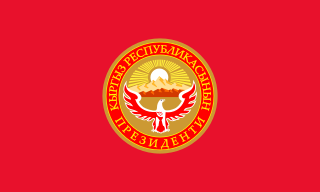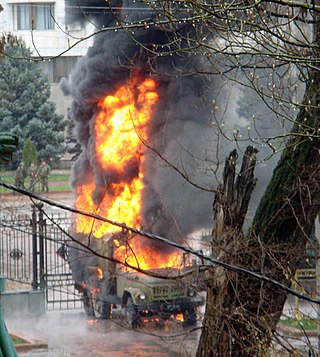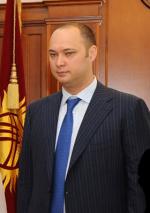
The history of the Kyrgyz people and the land now called Kyrgyzstan goes back more than 3,000 years. Although geographically isolated by its mountainous location, it had an important role as part of the historical Silk Road trade route. Turkic nomads, who trace their ancestry to many Turkic states such as the First and Second Turkic Khaganates, have inhabited the country throughout its history. In the 13th century, Kyrgyzstan was conquered by the Mongols; subsequently it regained independence but was invaded by Kalmyks, Manchus, and Uzbeks. In 1876, it became part of the Russian Empire, remaining in the USSR as the Kirghiz Soviet Socialist Republic after the Russian Revolution. Following Mikhael Gorbachev's democratic reforms in the USSR, in 1990 pro-independence candidate Askar Akayev was elected president of the SSR. On 31 August 1991, Kyrgyzstan declared independence from Moscow, and a democratic government was subsequently established.

The politics of Kyrgyzstan, officially known as the Kyrgyz Republic, takes place in the framework of a presidential system representative democratic republic, whereby the President is head of state and the Chairman of the Cabinet of Ministers is head of government. Executive power is exercised by the government. Legislative power is vested in both the government and parliament. The Economist Intelligence Unit rated Kyrgyzstan an "authoritarian regime" in 2022.

Kyrgyzstan elects on the national level a head of state – the president – and a legislature. The president is elected for a tenure of single six-year term by the people. The Supreme Council is composed of 120 members filled by proportional representation.

Parliamentary elections were held in Kyrgyzstan on 27 February and 13 March 2005. The belief that the elections had been rigged by the government led to widespread protests, culminating in the Tulip Revolution on 24 March in which President Askar Akayev was overthrown.
The Tulip Revolution or First Kyrgyz Revolution led to President of Kyrgyzstan Askar Akayev's fall from power. The revolution began after parliamentary elections on February 27 and March 13, 2005. The revolutionaries alleged corruption and authoritarianism by Akayev, his family and supporters. Akayev fled to Kazakhstan and then to Russia. On April 4, 2005, at the Kyrgyz embassy in Moscow, Akayev signed his resignation statement in the presence of a Kyrgyz parliamentary delegation. The resignation was ratified by the Kyrgyz interim parliament on April 11, 2005.

The president of Kyrgyzstan, officially the president of the Kyrgyz Republic, is the head of state and head of government of the Kyrgyz Republic. The president directs the executive branch of the national government, is the commander-in-chief of the Kyrgyz military and also heads the National Security Council.

Roza Isakovna Otunbayeva is a Kyrgyz diplomat and politician who served as the President of Kyrgyzstan from 7 April 2010 until 1 December 2011, becoming the first female Central Asian head of state. She was sworn in on July 3, 2010, after acting as interim leader following the 2010 April Revolution, which led to the ousting of President Kurmanbek Bakiyev. She previously served as Minister of Foreign Affairs and as head of the parliamentary caucus for the Social Democratic Party of Kyrgyzstan.

Felix Sharshenbayevich Kulov is a Kyrgyz politician who served as the 9th Prime Minister of Kyrgyzstan from 2005 to 2007, following the Tulip Revolution. He first served from 1 September 2005 until he resigned on 19 December 2006. President Kurmanbek Bakiyev reappointed him acting Prime Minister the same day, but parliamentary opposition meant Bakiyev's attempts to renominate Kulov in January 2007 were unsuccessful, and on 29 January the assembly's members approved a replacement.

Kurmanbek Saliyevich Bakiyev is a Kyrgyz politician who served as the second president of Kyrgyzstan, from 2005 to 2010. Large opposition protests in April 2010 led to the takeover of government offices, forcing Bakiyev to flee the country.
Tursunbai Bakir Uulu is a Kyrgyz politician, former ombudsman and presidential candidate. He is leader of the political party Erkin Kyrgyzstan (ErK). A teacher by training, a historian, and a doctor of philosophy he is married with four children.
Alikbek Jeshenkulov is the former Foreign Minister of Kyrgyzstan (2005–2007) and now the leader of the oppositional party "Za spravedlivost".

A new constitution of Kyrgyzstan was passed by referendum on 21 October 2007. It is based on the first post-Soviet constitution originally adopted on 5 May 1993.
Daniar Toktogulovich Usenov is a Kyrgyz banker and politician who served as the Prime Minister of Kyrgyzstan from October 2009 to April 2010. He previously served as Mayor of Bishkek.
Azim Beishembayevich Isabekov is a Kyrgyz politician who served as the 10th Prime Minister of Kyrgyzstan from 29 January until 29 March 2007.

Presidential elections were held in Kyrgyzstan on 23 July 2009. The date was set after the constitutional court ruled that the extension of the presidential term from four to five years did not apply until the next presidential election, calling for elections by 25 October 2009; in response, a parliament committee proposed the July election date, which was then passed by the incumbent president Kurmanbek Bakiyev's Ak Jol-dominated parliament. Bakiyev had previously announced his intention to run for reelection. Bakiyev was re-nominated on 1 May 2009.

Early presidential elections were held in Kyrgyzstan on 30 October 2011 to replace Interim President Roza Otunbayeva. Former Prime Minister Almazbek Atambayev of the Social Democratic Party of Kyrgyzstan won in the first round.

The 2010 Kyrgyz Revolution, also known as the Second Kyrgyz Revolution, the Melon Revolution, the April Events or officially as the People's April Revolution, began in April 2010 with the ousting of Kyrgyz president Kurmanbek Bakiyev in the capital Bishkek. It was followed by increased ethnic tension involving Kyrgyz people and Uzbeks in the south of the country, which escalated in June 2010. The violence ultimately led to the consolidation of a new parliamentary system in Kyrgyzstan.

Maksim Kurmanbekovich Bakiyev, is a Kyrgyz politician, the youngest son of former president of Kyrgyzstan, Kurmanbek Bakiyev, from his marriage to Russian-born Tatyana Petrova. He is a resident of the UK having been granted political asylum.
This article is a list of events in the year 2005 in Kyrgyzstan.

The Social Democrats is a political party in Kyrgyzstan founded in late 2019 by supporters of former President Almazbek Atambayev - legal successor from the Social Democratic Party of Kyrgyzstan (SDKP). After a conflict between Atambaev and his successor President Sooronbai Jeenbekov emerged and deepened in 2018, Atambayev accused of Jeenbekov in attempting to seize authority over the SDKP, a party that Atambayev himself formed in 1990s and served as a leader of. The SDK participated in the annulled 2020 parliamentary election. Current party leader is Temirlan Sultanbekov.











